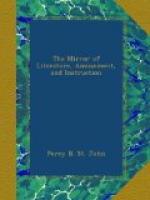It would be difficult to find a subject which has been more fervently treated by poets and philosophers, than the love of gardens. In old Rome, poets sung of their gardens. Ovid is so fond of flowers, that in his account of the Rape of Proserpine, in his Fasti, he devotes several lines to the enumeration of flowers gathered by her attendants. But the passion for gardening, which evidently came from the East, never prevailed much in Europe till the times of the religious orders, who greatly improved it.
Our anecdotical recollections of the taste for gardens must be but few, or they will carry us beyond our limits. Lord Bacon appears to have done more towards their encouragement than any other writer, and his essay on gardens is too well known to admit of quotation. Sir William Temple has, however, many eloquent passages in his writings, in one of which he calls gardening the “inclination of kings, the choice of philosophers, and the common favourite of public and private men; a pleasure of the greatest, and the care of the meanest; and, indeed, an employment and a possession, for which no man is too high or too low.” Perhaps John Evelyn did more than either of these philosophers. Temple’s garden at Moor Park was one of the most beautiful of its kind; but at the time when Evelyn introduced ornamental gardening into England, there were no examples for imitation. All was devised by his own active mind; and in the political storms of his time, his garden and plantations became subjects of popular conversation; while the intervals of his secession from public life were filled up in writing several practical treatises on his favourite science. At Wotton, in Surrey, may be seen the large, enclosed flower-garden, which was to have formed one of the principal objects in his “Elysium Britannicum;” and this idea has been partly realized by one of his successors.
Andrew Marvell has, however, anathematized gardens with much severity, in some lines entitled “The Mower against Gardens;” and commencing thus:—
Luxurious man, to bring his vice in use,
Did after him the world seduce,
And from the fields the flowers and plants
allure,
Where nature was most plain
and pure.
He first enclos’d within the garden’s
square
A dead and standing pool of
air;
And a more luscious earth from them did
knead,
Which stupify’d them
while it fed, &c.,
On the other side, old Gerarde asks his courteous and well-willing readers—“Whither do all men walk for their honest recreation, but where the earth has most beneficially painted her face with flourishing colours? and what season of the year more longed for than the spring, whose gentle breath entices forth the kindly sweets, and makes them yield their fragrant smells.” Lord Bacon, too, thus fondly dwells on part of its allurements:—“That flower, which above all others yields the sweetest smell in the air, is the violet. Next to that




